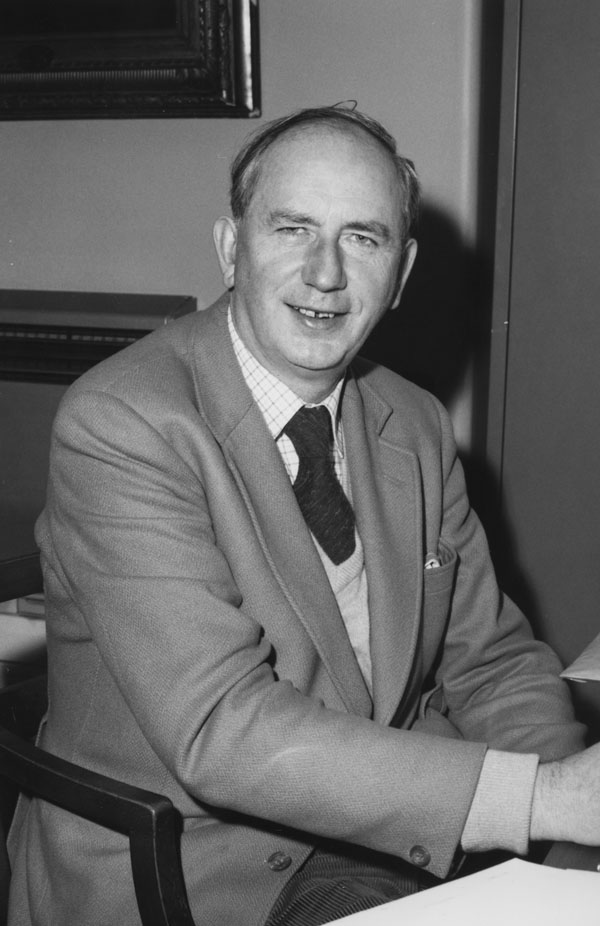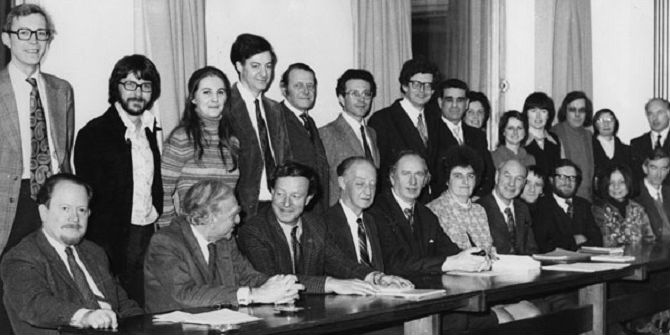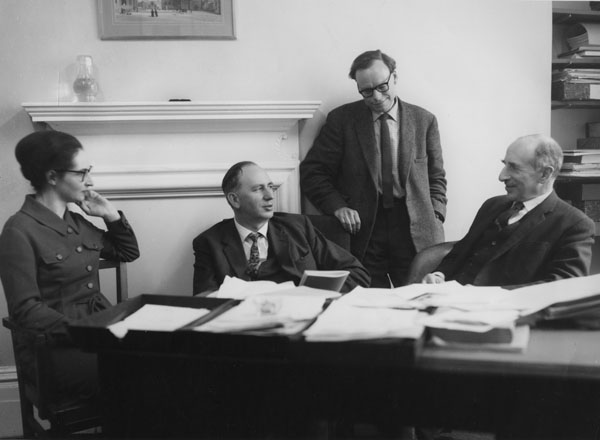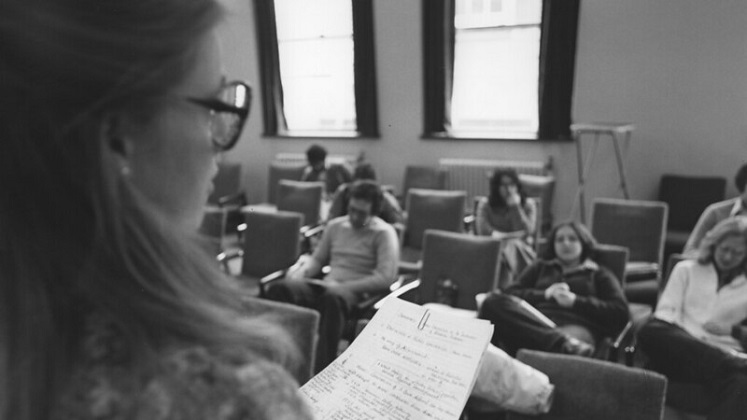The following speech in was first given by Professor George Jones at an event at LSE in memory of Professor Peter Self on Thursday 25 November, 1999. All speeches given were later published in the booklet “Speeches from the meeting in celebration of the life of Professor Peter Self 1919-1999, Emeritus Professor of Public Administration”, which Professor Jones is donating to LSE archives. Peter Self taught at LSE 1948-1982 and will be remembered by many staff and alumni.
In 1948 through the good offices of Harold Laski and William Robson, Peter began his long attachment to LSE, first as a lecturer in Public Administration, then as a Reader in Political Science (1961-63), and finally as Robson’s successor as Professor of Public Administration (1963-82). On taking early retirement in December 1982 he moved to Australia as Senior Research Fellow at the Australian National University, Canberra, which he had liked on an earlier sabbatical leave, and where Sandra, his third wife, had family. He had had periods of leave from LSE as a visiting academic at Harvard and Cornell, but Australia captivated him, especially Canberra which was the kind of garden city and new town he loved.
His first teaching at LSE was on subjects he stayed loyal to throughout his life. They were topics he had studied for his Oxford PPE degree, and had taught in his WEA and Extra-Mural classes. He first appears in the LSE Calendar for 1949-50 lecturing on Morals and Politics, exploring the relation between moral and political ideas, and the ethical basis of political philosophies. The syllabus covered ethical hedonism, utilitarian calculus, and the moral philosophies of modern political parties and political creeds. He also taught what he had been writing about on the Economist, giving a course on the problems of Local and Regional Government, and another on the State and Voluntary Organisations. During the 1950s he taught Public Administration and Planning. Some students of that time tell me they were most impressed by a series of lectures he gave on Government and Private Enterprise, where he discussed the partnership between government and private enterprise. It is good to know that LSE’s current Director, Tony Giddens, is carrying on Peter’s examination of the Third Way 40 years after Peter started it.
In his first years at LSE he retained contact with the Economist by contributing, on a part-time basis, articles on town planning, local government and agriculture. His first important book came out in 1957, Cities in Flood, a work of great influence on both academics and practitioners, about which Peter Hall will say something later.

Hi first major book on public administration was the co-authored volume The State and the Farmer (1962), an early example of pressure-group and policy-community study, showing the significance of administrative politics, as different groups of officials struggled for power. A recent British Academy survey of the study of politics in the twentieth century says of this book “it has certainly stood the test of time in terms of its relevance to the study of agricultural policy-making.” Its words about the relationship between the Ministry of Agriculture and the National Farmers Union could have been written amidst the 1996-7 crisis over BSE in cattle. The book observed: “Partnership in agriculture, whatever its specific advantages, has on the whole been much too close to be really healthy for either partner”, and that “Government by anxious compromise is not an inspiring process.”
At LSE Peter took full advantage of the early 1960s fashion for one-year masters courses by creating two that combined his chief academic interests: an MSc in Public Administration and an MSc in Urban and Regional Planning Studies, both of which still flourish today and attract the mix of foreign and home students that Peter so enjoyed teaching. I saw him shine in seminars. His style, like his participation in committees, was Socratic, quietly questioning what others proclaimed in a tone of somewhat whimsical and undogmatic scepticism. His concluding five-minute summaries wove together the main points tossed out by different students into a coherent and compelling analysis of the topic of the week. He conveyed a real intellectual excitement, not in simplifying issues, but in expounding the complexities of problems. He illuminated and unravelled the knotty issues the students had been tackling.
His teaching and research went together. His lectures for the MSc Public Administration were turned into his most substantial book, Administrative Theories and Politics (1972), still used as a key text throughout the world. It ranged comparatively over the administrative systems of a number of countries, exploring the theories underpinning their processes, and exposing administrative dilemmas. It was a major synthesis of his wide reading and thinking, displaying Peter’s insight and originality.
From the mid-1970s he became increasingly pained by dogmatists who propounded a blinkered focus to policy-making, and especially to the location of the third London airport. Peter felt they were acquiring too great a hold on the social sciences and on advice-giving to governments. He dubbed them “econocrats” in his polemical book Ecnocrats and the Policy Process (1976). He felt there were more factors to be taken into account than could be accommodated by the limited formulae of cost-benefit analysts. “Nonsense on stilts” was his verdict. This concern led to three further books that exposed and condemned the narrow approaches of idealogues who adopted simple market-based solutions to complex social problems. Political Theories of Modern Government (1985), Government by the Market? (1993) and his last work Rolling Back the Market (1999), completed only five weeks before his death.

His enemy was economic rationalism. He believed there was a public interest, shared by all in the community, which was not just the sum of the interests of individuals. Governments should promote this public interest, which could be discovered by research and judgement, and not by the application of economic formulae.
On Peter as a teacher: his former students speak of him with warmth and affection. I received a letter from an Indian professor who was a student here in the early 1970s. He writes that Peter “will be fondly remembered by his students for his deep personal affection for them, his attractive and dignified personality and his pungent comments and lively humour.” A colleague of mine reminded me that at Xmas Peter would seek out any of our foreign students with nowhere to go on Xmas day and invite them to his home. A colleague in another department wrote that Peter was always ready for discussion and for help with his students whose work required Peter’s expert knowledge.
He was a champion of inter-disciplinary work at LSE. He was an active member of William Robson’s Greater London Group, founded in 1957 to bring together academics interested in London’s government. His influence shaped its many publications and greatly enhanced its regular weekly proceedings. He succeeded Robson as Chairman in 1980.
Peter’s attitude to LSE could be both detached and committed. On the evening of student disorder in 1968, when internal gates were smashed down, when police ran through the corridors, and when the Director closed the School, Peter was in his room in the East block, totally unaware of what had happened. But a month later at a meeting of academic staff in Senate House Peter made a powerful speech calling for the School to be reopened. Some colleagues felt that this final appeal, “We should be there” was critical in the decision to reopen.
He was not active in the government of LSE. He did his time as convenor of the Government Department, but I am afraid the Professor of Public Administration was not a particularly effective or practical administrator. He introduced me to his novel filing system, which consisted of putting all incoming letters and papers into a large drawer in his desk. So when anything was needed he knew exactly where it was and could rummage for it. When the drawer was full, he threw the contents away, by which time, he said, the need for the papers had passed.
But his apparently disorganised methods of doing business belied his penetrating analytical intellect. His capacious mind was masterly in assembling and ordering a mass of contradictory data about any issue. He could dissect a problem and question a proposed solution, but while at LSE he seemed to hold back from asserting a Self solution. Australia seemed to liberate him to be more outspoken than when he was at LSE.

Physically he stood out. He was immensely tall – six feet four and a half inches – which led the editor of the Economist to call him “our perpendicular correspondent”. Lord Jenkins, Roy Jenkins who with Peter were the two PPE firsts at Balliol in 1941, recalled his “distinguished but drooping presence, rather like a kidney bean”. He walked, slightly stopping, slightly lumbering, with a shambling gait as if his long legs were impeded by his huge thick-soled brown shoes, and hairy brown and green tweed suits. Also distinctive were his thick orange or yellow socks, and his angler’s hat. A colleague said he looked like a farmer who had lost his way.
His first room at LSE in the 1950s was so small that students going for a tutorial recalled that when he stood up he blocked the light from the one minute window and the room went dark. In seminars when he sat in a low chair his knees seemed to loom higher than his head. But despite an overwhelming presence, his manners and style of speaking were gentle, with a chuckle not too far away, and even a hearty burst of laughter. He would have laughed at my last story from a colleague who recalled that a the formal opening of our new Library Building by the Queen Mother, Peter arrived somewhat late, as the Queen Mother was being walked down a row of shelves. Peter spotted her but thought she was the wife of a colleague. He advanced down the row saying: “Cynthia, my dear, I haven’t seen you in ages,” and was about to give her a smacking kiss but was prevented by the intervention of a lady-in-waiting.
Peter Self’s tribute to William Robson contained the following words that apply to Peter too. “Modern academics often aspire to a ‘scientific’ or sociological position and often distance themselves from involvement in practical affairs or reform movements. There is, however, an inescapable normative element in the study of politics and administration. It is hardly satisfactory to concentrate on processes without at least considering the ends which they are supposed to serve… Now (1980) that students of public administration are recovering their interest in good government, and strengthening their links with public policy analysis, they can learn much from the example of someone who was both a diligent scholar and tenacious idealist.”
Diligent scholar, tenacious idealist, superb teacher, public intellectual and concerned citizen – that was Peter Self.



